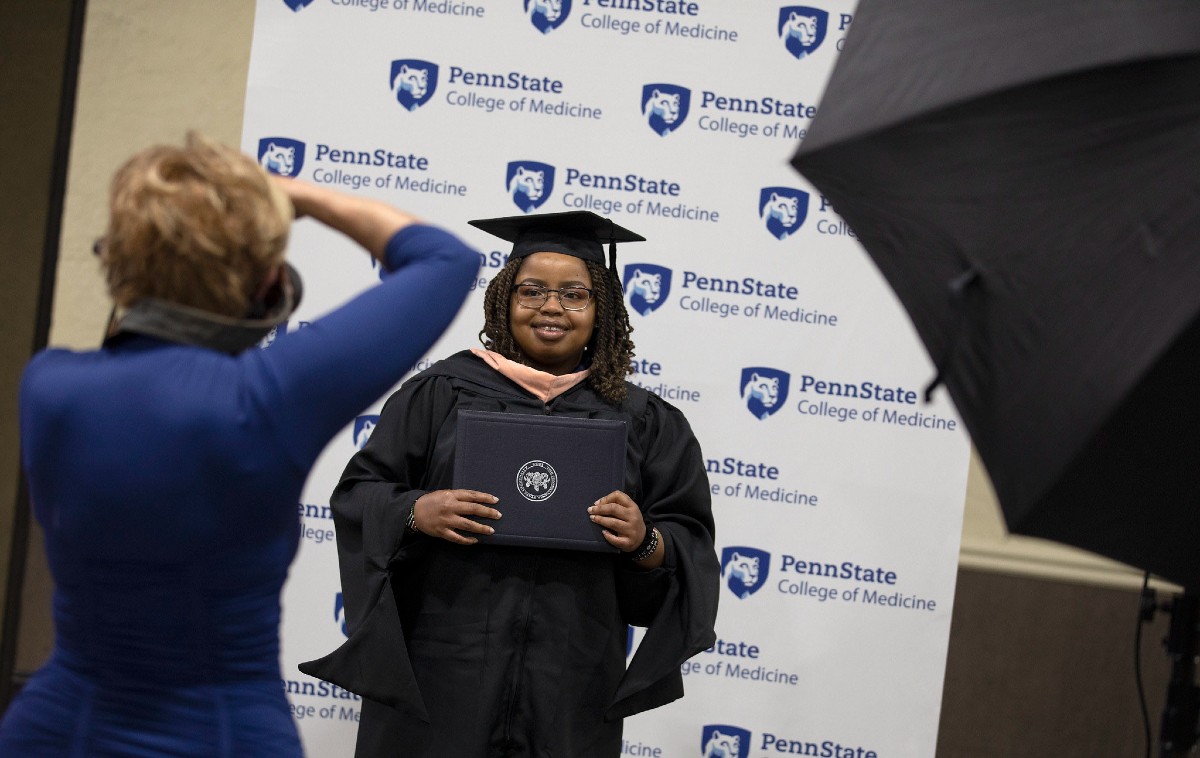Penn State graduate program team celebrates 10 years of shaping public health

As COVID-19 continues, universities in the U.S. have seen a surge in student inquiries and applications to public health graduate programs, according to the Association of Schools and Programs of Public Health.
For Penn State College of Medicine’s Master of Public Health (MPH) Program, the upward trend started well before the pandemic. The program continues to grow in scope and popularity, and this year recognizes a significant milestone — its 10th anniversary.
The Department of Public Health Sciences launched the program in 2010 to address an increasing demand for public health professionals. The 42-credit program provides the knowledge and skills necessary to improve population health through solving global problems and reducing disparities.
The MPH program welcomed its first cohort of 14 students in 2011. Now, more than 50 students are enrolled in the program. It has expanded to include a certificate program, a global health track, joint medical and law degrees, an international collaborative degree program and several Penn State integrated undergraduate-graduate programs through partnerships with Penn State College of Health and Human Development, Penn State Dickinson Law and Penn State Law and other groups.
More than 130 students have graduated from the program. Alumni work in an array of essential roles such as public health educators, biostatisticians, research project managers, public health administrators, clinical research coordinators and policy analysts. Some students go on to pursue doctoral degrees in the fields of epidemiology, education and health service research. Others pursue medical degrees after graduation.
“The MPH program at Penn State has come a long way over the past ten years. We are fortunate to have strong support from the department leadership,” Program Director Wenke Hwang said. “We have built a very competent and committed education team. Without leadership support and the team’s tireless efforts, we would not have accomplished all that we have.”
As part of the program, students specialize in one of the following areas:
- Community and Behavioral Health
- Epidemiology and Biostatistics
- Global Health
- Health Systems Organization and Policy
In each area, students participate in internships and complete capstone projects, which are designed to expose students to a wide range of real-world issues and enhance their skills in applying public health knowledge in the workplace.
While some students partake in research and service opportunities in the region, others choose to engage in international field experience and hands-on global health opportunities through the department’s Global Health Exchange Program. Since 2017, the MPH program has assembled an inter-professional student team from multiple Penn State campuses to compete with international teams in the Emory Morningside Global Health Case Competition.
“Due to the smaller class sizes, the program worked with me to ensure that I was meeting my academic goals and getting experiences that aligned with my future career goals,” said alumnus Michelle LaClair, who is now a public health sciences instructor and assistant director of student success. “For my MPH practicum, I had a rewarding experience working at the Lebanon VA Medical Center, which reaffirmed my decision to choose public health as my career.”
“The combination of a wide variety of classes, real-world experience, and knowledgeable and available faculty provided me with vital research skills and has led to my current job at Penn State College of Medicine,” adds Edeanya Agbese, an alumnus and research project manager.
How it all started: The early years
Originally named Health Evaluation Sciences, the department debuted in 1997 with help from the late Dr. Mark Young, who served as the department’s inaugural chair. He sought to create a master’s degree program that would help regional physicians conduct independent and collaborative research. This concept laid the groundwork for the Department of Public Health Sciences’ graduate education programs, which began with the Master of Science Program in the summer of 1999.
The department appointed Vernon Chinchilli chair in 2005. Two years later, the College renamed it the Department of Public Health Sciences.
“I am very proud of the MPH program that the department has initiated and refined over the past ten years,” said Dr. Chinchilli. “Graduates of that program have affected public health in the Commonwealth of Pennsylvania and beyond. In addition, program’s success led to the development of the Doctor of Public Health (DrPH)program, which launched in 2016.”
Dr. Roger Anderson oversaw the development of the curriculum and served as the inaugural program director. Since 2014, Hwang and associate director Carol LaRegina have led the program.
“The MPH program has continued to grow over the last decade and is well-known for producing highly-qualified public health professionals who work all around the world,” LaRegina said. “Our students come from a wide range of backgrounds and move into the workforce with the skills needed to improve public and population health.”
The Council on Education for Public Health accredited Penn State’s MPH Program in 2014. Today, it remains the only CEPH-accredited, public health graduate program in central Pennsylvania.
The program continues to expand and adapt to the changing needs of public health by entering into a partnership with Taipei Medical University in Taiwan for an international collaborative degree program looking to expand the accelerated MPH program to include undergraduates from Penn State Department of Nutritional Sciences.
“Moving forward, we are envisioning steady growth of our program,” Hwang said. “We are working hard to ensure high-quality teaching, form a welcoming learning environment and provide good support services to enhance our student learning experiences and outcomes.”
If you're having trouble accessing this content, or would like it in another format, please email Penn State Health Marketing & Communications.
